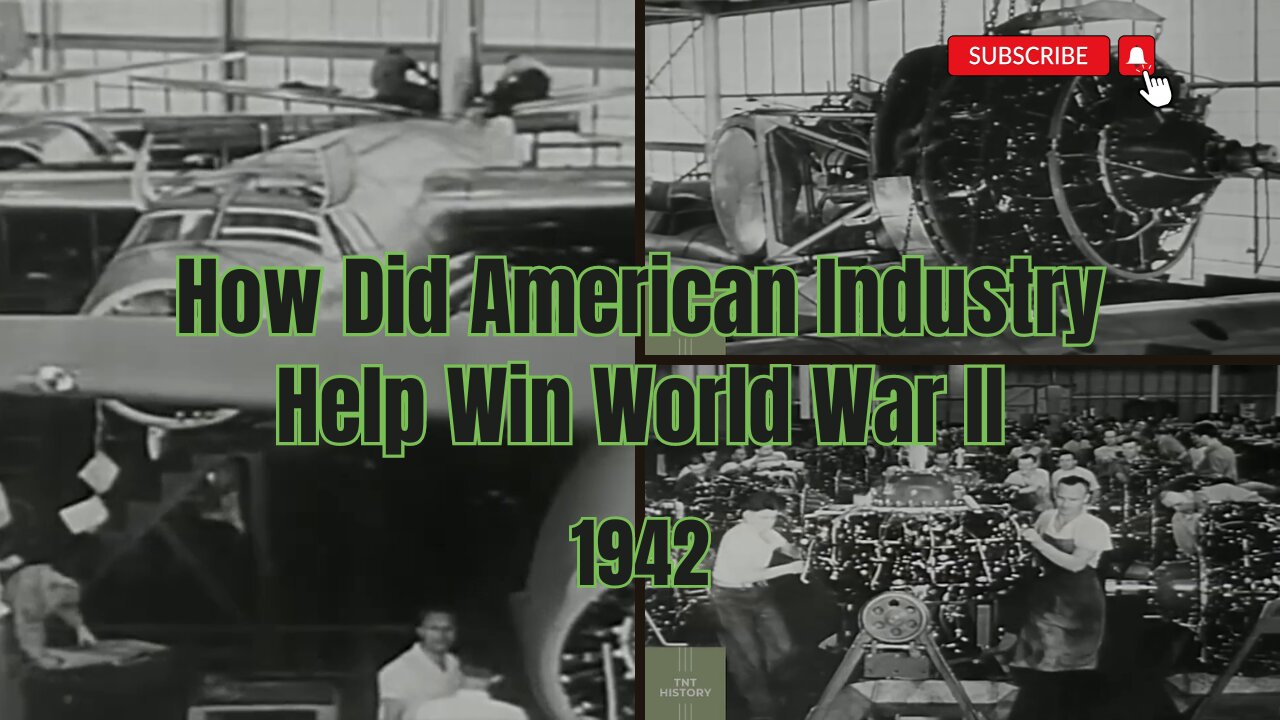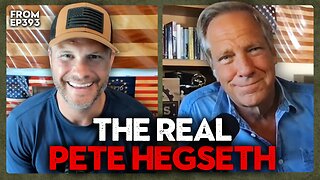Premium Only Content

From Factory to Frontline: The Story of WW2 Industrial Triumph | US Army Documentary 1942
►Twitter /X : https://twitter.com/history_tnt
The 1942 US Army documentary film is a compelling exploration of the pivotal role played by industry in securing victory during World War II. The narrative extends a positive call for unity, emphasizing the importance of collaboration between management and labor, as well as between civilian workers and the armed forces. A striking contrast is drawn between America's free industrial labor force and the subjugation of workers in nations overrun by Axis powers.
Historical Background/Context:
Despite early warnings of war, the United States found itself ill-prepared for the outbreak of World War II. The lingering effects of the Great Depression, which spanned from 1929 to the late 1930s, had eroded many of the country's machine and tool industries. The military was woefully undersupplied, and soldiers were forced to drill with toy guns and wooden tanks. However, the demands imposed by the United States' participation in the war proved to be a potent remedy for the long-lasting consequences of the Great Depression.
The Roosevelt administration, building on the New Deal's social liberal programs from 1933 to 1938, sought to maintain significant control over the economy. Government programs, originally instituted to combat the economic crisis, now shifted focus to meet the massive war demands. Production surged, closed factories reopened, and new ones were established, generating millions of jobs in both private and public sectors. Industries adapted to meet the insatiable needs of the military, integrating two-thirds of the American economy into the war effort by the end of 1943.
Controlled Production:
Central to wartime economic management was the War Production Board (WPB), established by Roosevelt on January 16, 1942. The WPB's mission was to regulate material production in the United States during World War II. It converted and expanded peacetime industries, allocated vital materials, established production priorities, and prohibited nonessential output. Rationing was implemented for commodities such as gasoline, heating oil, metals, rubber, paper, and plastics.
The impact was profound, with military aircraft production soaring from 6,000 in 1940 to 85,000 in 1943. Silk ribbon factories transformed into parachute producers, automobile manufacturers shifted to tank production, and typewriter companies retooled for machine gun manufacturing. The WPB ensured efficient allocation of materials, supervising the production of $183 billion worth of weapons and supplies from 1942 to 1945, constituting 40% of the world's munitions output. One-fourth of the US output comprised warplanes, and one-fourth warships, all while maintaining a stable civilian standard of living.
The War Production Board dissolved shortly after Japan's defeat in 1945, succeeded by the Civilian Production Administration. Commercial institutions, having invested billions in war bonds during the conflict, held an estimated $24 billion at war's end.
Labor:
The war mobilization eradicated the unemployment problem, reaching a record low of 700,000 in fall 1944. Wartime production generated millions of new jobs, coupled with a decline in the available workforce due to the draft. To meet the unprecedented labor demand, retirees, housewives, and students entered the workforce, driven by patriotism and competitive wages.
Labor shortages affected agriculture, prompting volunteers, retirees, and those in search of work to move to cities for factory jobs. Concurrently, agricultural commodities were in high demand for military and civilian populations, leading to federally controlled production, prices, and markets. "Victory gardens" were encouraged among civilians, and children were mobilized to contribute to these efforts.
The unique labor demands of the time provided historically excluded groups, including African Americans and women, unprecedented access to employment opportunities.
#Frontline #IndustrialTriumph
-
 25:59
25:59
TampaAerialMedia
1 day ago $1.19 earnedUpdate ANNA MARIA ISLAND 2025
22.3K3 -
 59:31
59:31
Squaring The Circle, A Randall Carlson Podcast
11 hours ago#039: How Politics & War, Art & Science Shape Our World; A Cultural Commentary From Randall Carlson
17.4K2 -
 13:21
13:21
Misha Petrov
11 hours agoThe CRINGIEST Thing I Have Ever Seen…
14.5K37 -
 11:45
11:45
BIG NEM
7 hours agoWe Blind Taste Tested the Best Jollof in Toronto 🇳🇬🇬🇭
9.1K -
 15:40
15:40
Fit'n Fire
10 hours ago $0.20 earnedArsenal SLR106f & LiteRaider AK Handguard from 1791 Industries
7.82K1 -
 8:34
8:34
Mike Rowe
6 days agoWhat You Didn't Hear At Pete's Confirmation Hearing | The Way I Heard It with Mike Rowe
45.8K19 -
 7:13:44
7:13:44
TonYGaMinG
12 hours ago🟢LATEST! KINGDOM COME DELIVERANCE 2 / NEW EMOTES / BLERPS #RumbleGaming
67.8K4 -
 40:17
40:17
SLS - Street League Skateboarding
4 days agoEVERY 9 CLUB IN FLORIDA! Looking back at SLS Jacksonville 2021 & 2022 - Yuto, Jagger, Sora & more...
111K1 -
 2:00:47
2:00:47
PaddysParlorGames
21 hours agoSunday Parlor Chill: GOBSTEIN
70.1K5 -
 LIVE
LIVE
Major League Fishing
5 days agoLIVE! - Bass Pro Tour: Stage 2 - Day 4
139 watching